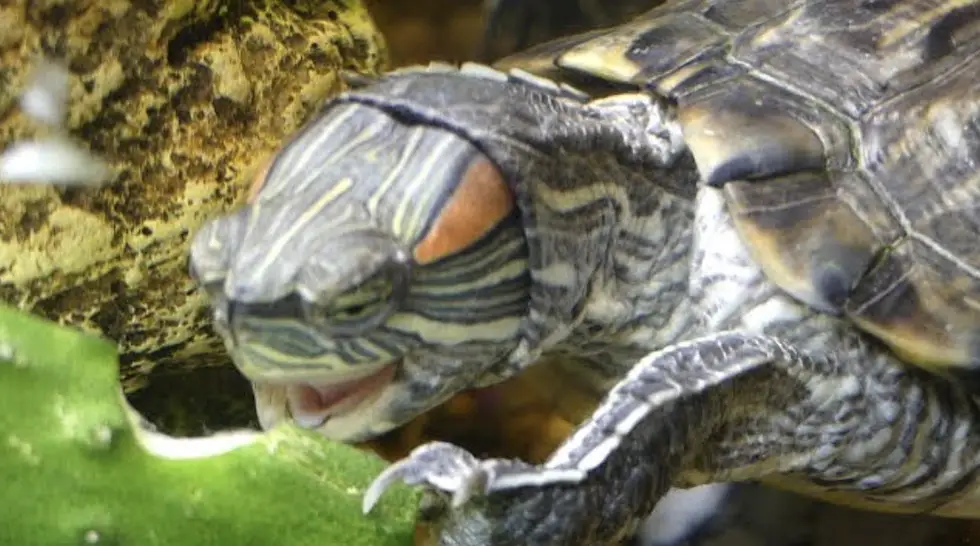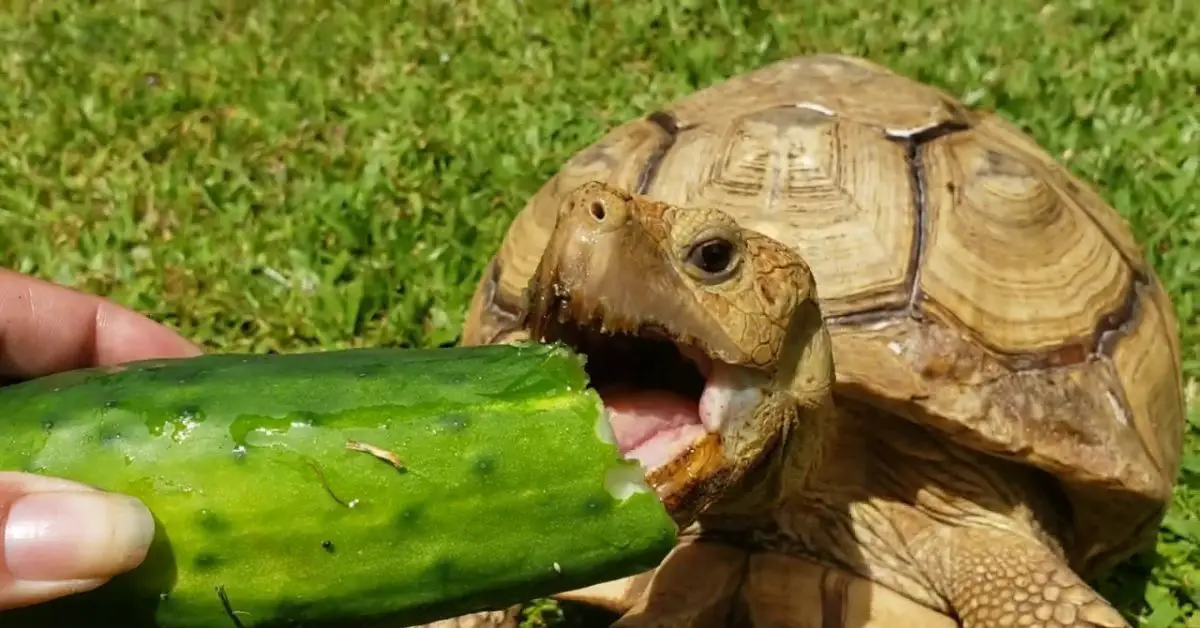As a turtle owner, you want to provide the best nutrition possible for your shelled companion. It’s important to know what foods are safe and healthy for your turtle, as well as what should be avoided. One common food that many turtle owners have questions about is cucumbers.
Can turtles eat cucumbers? In this article, we will explore the nutritional value of cucumbers for turtles and whether or not they should be included in their diet.
Cucumbers are a popular vegetable among humans, but do they offer any nutritional value for turtles? While turtles are known to be omnivores, their diet should consist primarily of protein-rich foods such as insects, fish, and meat.
Fruits and vegetables can be offered in moderation as a supplement to this diet. In the following paragraphs, we will examine the nutritional benefits and potential drawbacks of feeding cucumbers to your turtle.
The Nutritional Value of Cucumbers for Turtles
Cucumbers are one of the most popular and nutritious vegetables for humans, but can they also be beneficial for turtles? The answer is yes. Cucumbers are an excellent source of water and hydration for turtles, as they are rich in water content. This is especially important for turtles, as they require a lot of water to maintain their health.
Cucumbers are also a rich source of vitamins and minerals that can benefit turtles. Vitamin A, which is essential for healthy eyesight, is abundant in cucumbers. Similarly, vitamin C helps in boosting the immune system of turtles, while vitamin K strengthens bones and promotes healthy blood clotting. Potassium and magnesium are two minerals that are important for maintaining cardiovascular health and regulating blood pressure, and cucumbers are a rich source of both.

One interesting fact about cucumbers is that they contain a compound called cucurbitacin, which can help with joint inflammation and pain. This can be particularly beneficial for turtles that have joint problems.
However, it is important to note that cucumbers should not be the sole source of nutrition for turtles. They should be fed as a supplement to a balanced diet that includes other vegetables, fruits, and proteins. Additionally, cucumbers should always be cut into small, bite-sized pieces to avoid choking hazards.
Pros and Cons of Feeding Cucumbers to Turtles
Cucumbers are a low-calorie, high-water content vegetable that can be used as a supplement to a turtle’s diet of protein-rich foods. As a result, it is a nutritious and refreshing choice for a turtle. Cucumbers are also readily available and relatively inexpensive to buy
However, cucumbers do not meet all the nutritional needs required for a turtle’s diet. They are low in protein and other vital nutrients, such as calcium and vitamin D3, which are essential for the development and growth of turtle shells. Additionally, cucumbers contain a high level of water that can cause diarrhea if fed in excess. Therefore, it is essential to balance the quantity of cucumbers and other vegetables in the turtle’s diet, taking into account their specific nutritional requirements.
You may also like: How Much Water Does A Turtle Need?
What Other Foods Should Turtles Eat with Cucumbers?
Cucumbers alone cannot provide all the necessary nutrients that turtles require in their diet. Therefore, it’s important to feed them a variety of foods along with cucumbers. Leafy greens, such as kale, collard greens, and turnip greens, are excellent sources of calcium, essential for the growth and development of strong bones in turtles.
In addition to leafy greens, fruits such as berries, apples, and bananas can provide additional vitamins and minerals. For protein, you can feed them insects such as crickets, mealworms, and dubia roaches. However, it’s important to note that insects should be fed in moderation as they are high in protein and fat. By providing a balanced diet of a variety of foods, you can ensure your turtles are healthy and happy.
How to Prepare Cucumbers for Your Turtle
When it comes to feeding your turtle cucumbers, preparation is key. First, it is important to wash the cucumber thoroughly to remove any dirt or harmful chemicals. You can then slice it into small pieces, making sure to remove any seeds or tough sections. This will make it easier for your turtle to eat and digest.
It is also a good idea to mix the cucumber with other foods to provide a balanced diet for your turtle. You can add leafy greens like kale or collard greens to the cucumber to enhance its nutritional value. Additionally, you can sprinkle a reptile vitamin supplement over the cucumber to ensure your turtle is getting all the necessary nutrients. Overall, preparing cucumbers for your turtle is a simple process that can provide a healthy and enjoyable treat for your shelled friend.
Recommended Reading: Do Turtles Bite Humans?
Risks and Precautions When Feeding Turtles Cucumbers
Feeding turtles cucumbers comes with several risks and precautions that have to be taken into consideration. Firstly, while cucumbers are safe for turtles to consume, feeding them large quantities can lead to digestive problems. Since turtles are not built to digest fruits and vegetables, it is best to keep cucumber feeding as a rare treat rather than a regular part of their diet.
Furthermore, it is crucial to ensure that the cucumbers fed to the turtles are organic and pesticide-free. If pesticides are present on the cucumber skin, they may be harmful to the turtle’s health. Additionally, it is essential to chop the cucumbers into small, bite-sized pieces to avoid any choking hazards. As always, it is essential to monitor the turtle’s feeding habits and observe any adverse reactions such as diarrhea or vomiting. In case such issues arise, it is recommended to contact a veterinarian immediately.
Are Some Turtle Species Better Suited for Cucumber Consumption?
When it comes to nutrition, not all turtle species are created equal. Some turtles may have a digestive system that is better suited to consuming cucumbers. For instance, tortoises are known for their herbivorous diet and can consume a wide range of plants, including cucumbers. Also, aquatic turtles like the red-eared slider can eat cucumbers, while the box turtle may not find it appetizing.
The digestive system of turtles is not the same as that of mammals or birds. Some turtles are equipped with a more complex digestive system, similar to that of cows, which helps them break down fibrous vegetation. Other species may require more proteins and nutrients that they can find in other sources. Therefore, care should be taken to understand the nutritional needs of the turtle species before introducing cucumbers or any other food item to their diets.
More to Explore: What Is The Adaptation Of A Turtle?
Frequently Asked Questions about Turtles and Cucumbers
Frequently Asked Questions about Turtles and Cucumbers:
1. Can all species of turtles eat cucumbers?
Yes, most species of turtles can eat cucumbers as part of their diet. However, it is always recommended to consult a veterinarian or an expert in turtle nutrition before introducing any new food to your pet turtle’s diet.
2. Can turtles eat cucumber seeds?
Answer: Yes, turtles can eat cucumber seeds along with the flesh of the cucumber. However, cucumber seeds should be offered in moderation, as they are high in fat and can cause digestive problems if overeaten.
3. How often should I feed my turtle cucumber?
Cucumbers can be offered as an occasional treat to turtles, not as a staple food. A balanced diet for a turtle should include a variety of vegetables, fruits, and proteins. It is important to provide a balanced and varied diet for your turtle to maintain their health.
4. Can cucumber be harmful to turtles?
Cucumbers are safe for turtles to eat, but overfeeding can lead to digestive problems or nutrient deficiencies. As with any food, it is important to offer a balanced and varied diet to your pet turtle to avoid health problems. Keep in mind that some turtle species may have dietary restrictions due to their natural habitat and eating habits.
Wrap-up
After exploring the topic thoroughly, it is clear that turtles can eat cucumbers and they can even provide many nutritional benefits. Cucumbers are low in fat and calories, high in fiber, and contain vitamins and minerals such as vitamin C and potassium that are essential for a turtle’s overall health. However, it is important to note that cucumbers should not make up the bulk of a turtle’s diet and should be provided as a supplement to a balanced diet consisting of other vegetables, fruits, and proteins.
In conclusion, feeding cucumbers to turtles can be a healthy and nutritious addition to their diet when provided in moderation and as part of a balanced meal plan. As with any food, it is important to research and understand the nutritional needs of your turtle and consult with a veterinarian or reptile expert if you have any questions or concerns. By providing a well-rounded diet, we can ensure that our turtles thrive and maintain good health for many happy years to come.
Further Reading: How Often Do Turtles Shed?

